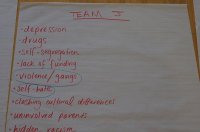Teaching At-Risk Youth: Looking Back 50 Years
When it comes to at-risk students in our urban schools we still seem to be looking for the right answers. I thought it would be instructive to look back at wisdom from about 50 years ago, around 1963, to be exact. Our guide is Lois Weiner, who, in 1993, published a book that was looking back then at 30 years of school reform (Preparing Teachers for Urban Schools).
Three things jump to the forefront. First, is the absence of any discussion of social-emotional learning, character education, social competencies, school culture and climate, and the like. This was not on the radar screen, at least not directly, until 1993.
Second is the matter of caring. Caring seems to be the aspect of teaching that is most valued by students, and yet most fragile on the part of teachers working with this population. Because of their personal contexts, at-risk and underserved urban students often come to school with even greater needs to be cared for than other students. At the same time, teachers working with in urban schools often have less life experience and training in working in this context and with interacting with such students. As a result, they can misinterpret students' seeming lack of motivation for disinterest, rather than testing the teachers. Or they are not prepared to deal with what seems like excessive amounts of neediness, disclosure of difficult person situations, and an almost boundless desire to be reassured and appreciated.
Third is the issue of dealing with discontinuity. For a variety of reasons, legitimate or not, the learners in question miss a lot of class time. Multiplied over a classroom of 25 students, it means that those teaching are almost always dealing with students who are not "caught up" on the previous work. So every new lesson is met with a subset of students who are mystified, assuming that they are still motivated to try to keep up with the lessons. Teaching under these circumstances requires different preparation and pedagogy than one might need for teaching in more advantaged suburban contexts.
And that leads to the fourth area: preparation for teaching at-risk and underserved urban students must be different. Weiner states clearly that schools of education must change aspects of how they prepare future teachers. Their list reads like a contemporary list, with perhaps the first element being a bit more enlightened than many current discussions:
- University/college faculty must spend more time in the urban education context as part of training and supervising their students.
- Increased amount of time must be given to supervised practice experiences in the urban education setting, including the notion of internships.
- Much greater time must be devoted to reflecting on practice, both individually and in shared circumstances. Such reflection would allow for time to address the issues of caring, discontinuity, and cultural familiarity.
The question we should be asking, of course, is why so much collective wisdom, consistent over decades, has not been implemented. Perhaps more time needs to be spent on putting research into practice. One positive element is that the upsurge of work on social-emotional learning, character education, service learning, and project-based learning all provide excellent platforms for addressing a number of issues in the pedagogy of urban and at-risk learners.
However, unless there are ways to provide added supervised training beyond current minimal requirements, and to address the discontinuity of pedagogy, even an influx of SEL and related approaches will not be a game changer.
What are your thoughts on this topic? Please share in the comment section below.
